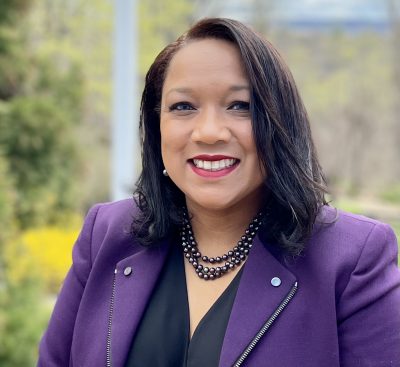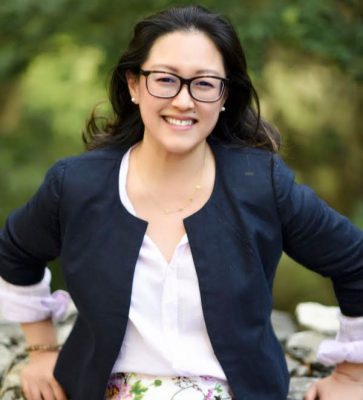Pair of Candidates Contest Single Board of Ed Seat in Chappaqua
Voters in the Chappaqua School District will have a choice of two candidates in Tuesday’s Board of Education race. First-time candidate Ellen Exum will be joined on the ballot by Cailee Hwang, who ran unsuccessfully for the board in 2019.
Current Vice President Holly McCall will be leaving the board at the end of next month after opting to run for New Castle supervisor later this year.
Ellen Exum

Exum said she jumped into the race to support the district’s students and serve the community. The human resources executive has been active as part of the West Orchard Elementary School and Seven Bridges Middle School Diversity Committees, served as a volunteer library reader for the Virtual Read Aloud Series and was a member of the Women’s Economic Development Council (WEDC) Advisory Council Member.
She said she wants to help develop well-rounded global citizens in addition to have them achieve academically.
“I believe my background in business and behavioral economics and navigating in a world where collaboration, design thinking, communications and getting things done will help me in putting students in the center of all we do and influence policy, practice and the people agenda of the board,” Exum said.
The district should be measured on objective quantitative and qualitative measures, she said. Quantitative assessments are reflected in test score or report card improvement, which allows for students with different capabilities to show growth and close gaps and in acceptance rates to higher education and careers. Qualitative scores are measured in surveys and feedback.
“I think the school district would likely score well on the absolute quantitative academic results as indicated on sites like www.greatschools.org,” said Exum, 49. “I think we have areas of opportunity and do not do as well in our qualitative scores and that experiences will significantly vary.”
Exum said the district has had an innovative response in handling the COVID-19 crisis, helping students with remote learning and the return to the classroom. There were unexpected challenges, such as building WiFi and technical training for staff. It has been burdensome for families and sometimes unpredictable and the academic effectiveness has varied greatly, she said.
The past year has been particularly challenging for those with specific or special needs.
“I believe we need to take a moment to understand and address how our students have been impacted by the curriculum changes that we had to make due to the pandemic, and the emotional stress our students may have experienced from social distancing,” Exum said.
There may be a role for remote learning going forward, such as being used for extracurricular programs or additional academic support when face-to-face instruction isn’t possible, she said. Plus, the technology, apps and additional communication vehicles should continue. However, Exum said remote learning has not been developed sufficiently to be a full-time replacement for in-person instruction.
She said provided there are enough funds closing the academic gaps and addressing the emotional stress of students who may have experienced from social unrest and COVID-19-related social distancing is warranted.
The district should also review and expand the curriculum to develop students as global citizens, which will require a racial equity lens when assessing coursework, and adding talent to the teaching staff and administration. Furthermore, there can be instructional and technology tool investments to apply evidence-based and personalized learning opportunities for all students, including those with specific and special needs.
Exum said she isn’t fully satisfied with the district’s response to last year’s emergence of the racist TikTok video. While hiring a director of equity, inclusion and wellness was a start, the revisions aren’t just related to curriculum but they must also include environmental changes.
“I believe more transparency is needed to fully address the shortcomings,” Exum said. “My observation is that we hide behind privacy and timing so as not to be performative without substance.”
There should be an annual review of the Code of Conduct; clear, regular communication of expected student behavior and consequences; and an urgency to reevaluate curriculum and repeating lesson plans at every grade, Exum said.
The students’ social and emotional well-being is deprioritized compared to academics in Chappaqua, according to Exum. Depression, anxiety, self-harm and stress are real problems for some students, she said.
Exum said the district should emphasize specialized social and emotional well-being staff ratios and training teachers and administrators to recognize signs of emotional distress and regularly communicate to parents. There should be assessments to understand social and emotional issues, similar to academic assessments, and the district could offer curated lists of professionals, learning opportunities and events to parents, staff and students.
“We should teach our kids that mental health issues are not a stigma and provide a system to seek help,” Exum said.
Cailee Hwang

A literacy specialist who has worked in city and suburban school districts, Hwang said she decided to run again for the Board of Education because she believes that the board would benefit from having an educator’s perspective.
She also is invested in the community with three sons in the district’s schools, and in the 2022-23 academic year, Hwang will have one child each in elementary school, middle school and the high school.
“I kind of have a feel, a pulse of what the schools are like, and the fact that I’m a teacher doesn’t change,” said Hwang, who moved to Chappaqua with her family eight years ago.
“This is something that I care about, I really do, in a passionate way, and I’m running because I really want to be that person, and where I have concerns with this district,” she added. “I do. I can’t say everything’s perfect, and I can’t promise that it ever will be perfect because, guess what, the people who are living here, us, me included, we’re not perfect.”
If elected, Hwang pledged to be approachable and to listen to all district residents and the concerns that they share. She also said she wouldn’t be hesitant to ask questions and acknowledge that she doesn’t know everything.
Furthermore, diversity is not only about race and ethnicity, which are certainly important, but a variety of other factors, including life experience.
“When I think about diversity, I’m thinking no educator on the board, right? Let’s have a different perspective,” Hwang said. “I understand the board’s job is not to micromanage teachers or curriculum. But the district has gone through a lot.”
While the Chappaqua schools and the community are blessed in many ways, there are some academic improvements that can be considered, including reading and writing instruction and also in science, Hwang said.
She commended the district for being able to bring back students in grades K-8 for in-person instruction from the start of the school year and going with a hybrid model for the high school. Credit goes to the teachers but also to the entire school community, including the parents and the PTAs, for pulling together to provide as much of an in-school experience as possible.
However, Hwang cautioned that there are going to be learning gaps, and the key for district officials is how those gaps are addressed. The roles of the guidance counselors and the school psychologists will be crucial in helping students who have been most affected to continue successfully.
“The incredible stress behind this pandemic life affects every single person; whether you want to admit it or not, it’s there,” Hwang said.
The pandemic, however, has forced the district to think outside the box and come up with creative solutions.
“I think that the question that needs to be asked is what are we trying to accomplish and are we really going to be able to achieve that for our students?” Hwang said. “If it’s on the positive and it will work, then yeah, but if it can’t work, then no.”
With new development having already taken place in town, and the townhomes at Chappaqua Crossing now approved, there has been concern expressed that it could overload Grafflin Elementary School and Robert E. Bell Middle School.
Hwang said that not only is the district aware of the potential challenge, but she expressed confidence that if redistricting would be necessary it would be done equitably with the goal of maintaining educational excellence at each school.
Following last year’s emergence of a racist TikTok video, the district was forced to focus on both overt racism and implicit biases. Hwang, who is a member of the Roaring Brook Elementary School Diversity Committee, the district’s advisory committee for Anti-racism, Equity and Social Justice, said the incident lit a fire under the community, forcing residents to address an uncomfortable truth.
“You start to realize that as a minority person, you know that this exists, and no community is excluded,” Hwang said. “It’s not exclusive to Chappaqua.”
Another issue is the need to attract and maintain a more diverse set of educators, she said.
Communication with the public can also be improved and everyone must listen to each in order to come to the best decisions.
“We need to be in thoughtful discussions and listen and talk and communicate in order for things to happen,” Hwang said. “If we don’t, nothing, nothing, I don’t care if it’s about redistricting, I don’t care if it’s about eighth-grade math, it won’t happen.”

Martin has more than 30 years experience covering local news in Westchester and Putnam counties, including a frequent focus on zoning and planning issues. He has been editor-in-chief of The Examiner since its inception in 2007. Read more from Martin’s editor-author bio here. Read Martin’s archived work here: https://www.theexaminernews.com/author/martin-wilbur2007/
